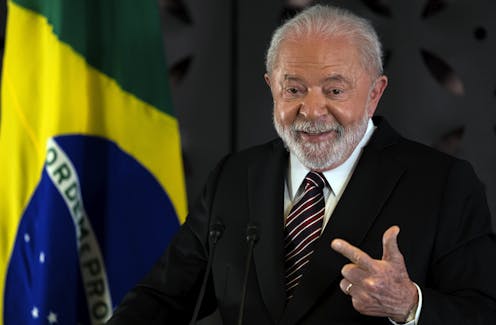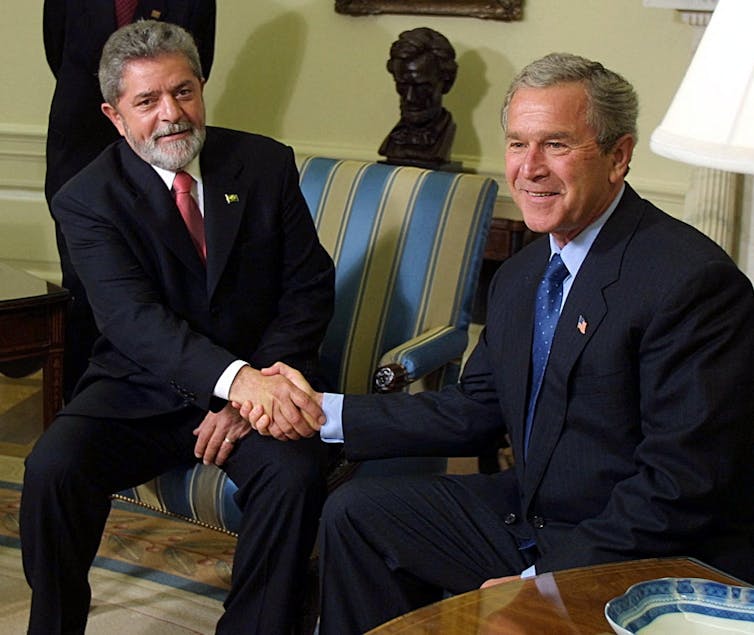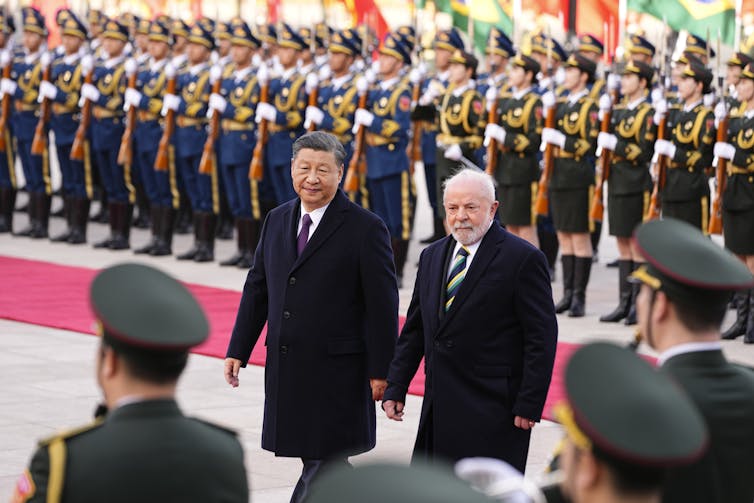Lula's diplomatic dance is nothing new for Brazil or its leader -- what has changed is the world around him
- Written by Rafael R. Ioris, Professor of Modern Latin America History, University of Denver
 Is Lula pursuing divisiveness or diplomatic pragmatism on the world stage?AP Photo/Louise Delmotte
Is Lula pursuing divisiveness or diplomatic pragmatism on the world stage?AP Photo/Louise DelmotteBrazilian President Luiz Inacio Lula da Silva is a man currently very much in demand in international circles.
In April, the leftist leader was being courted by China during a high-profile visit to Beijing. That was followed a month later with an invite to the G7 summit in Japan, where Lula rubbed shoulders with leaders of the largest economies of the so-called Global North. In recent weeks Brazil’s president has also been busy restoring regional ties in Latin America and pushing a proposed path to peace in Ukraine.
Lula’s diplomatic whirlwind has confounded his critics. He has been accused of “cozying up” with the United States’ enemies or “playing both sides” over Ukraine.
But as a scholar of Brazil and its position in the world, I believe Lula’s actions reflect two main elements: one relating to global geopolitical developments, the other tied to the Brazilian leader’s long-held vision.
The rise of China and the war in Ukraine have underscored that the unipolar reality of the 1990s – under which the U.S. was the predominant power – is being seriously challenged. In its place appears to be emerging a bipolar dynamic in which Beijing and Washington battle for influence – or a multipolar world in which regional powers compete for hegemony.
Anticipating this new world ordering, nations that have historically aligned with the European-U.S. center of power – particularly those in places like Latin America – are repositioning themselves. This seems to be the case for Brazil, the largest nation and economy in South America.
Waning US influence in Latin America
During much of the 20th century, Brazil developed in close economic cooperation with the U.S. while managing to sustain a largely autonomous foreign policy.
But since 2001, U.S. influence in Brazil has diminished as Washington has pivoted its attentions away from the region to first the Middle Eastand then Asia. In the same period, China replaced the United States as Brazil’s most important economic partner. Figures from 2021 show China received 31% of Brazilian exports compared with the United States’ 11.2%, and supplied 22.8% of its imports, compared with the United States’ 17.7%.
Reviving Lula-ism, strenghening the BRICS
Meanwhile, Lula’s return to the presidency in January 2023 has paved the way for a revival of an ambitious and assertive foreign policy set out by the leader during his first term in office between 2003 and 2010.
During this earlier period, the metalworker-turned-president managed to sustain good relations with both the Bushand Obama administrations while also seeking to diversify Brazil’s economic and geopolitical partners, especially in the Global South.
 Brazilian President Luiz Inacio Lula da Silva with U.S. President George W. Bush in 2003.Manny Ceneta/AFP via Getty Images
Brazilian President Luiz Inacio Lula da Silva with U.S. President George W. Bush in 2003.Manny Ceneta/AFP via Getty ImagesHe also played a central role in the creation of the BRICS, a loosely defined multilateral bloc consisting of Brazil, Russia, India, China and South Africa. The bloc has helped reshapethe economicand geopolitical balance of the world over the past two decades.
Since returning to power, Lula sought to strengthen the BRICS bank – a funding agency for developmental projects in the Global South that offers a financial alternative to the World Bank. In a show of intent, Lula pushed for the appointment of ex-Brazilian president – and his former chief of staff – Dilma Rousseff to head the agency.
Much as with his domestic agenda of rebuilding social programs, undermined by his predecessor Jair Bolsonaro, in the international arena Lula is looking to restart his project of strengthening Brazil’s ties with a variety of partners. In his first month in office, Lula attended a meeting of the Community of Latin American and Caribbean nations (CELAC) in Argentina, where he outlined a desire to strengthen Brazil’s relations in the region.
Soon after, he visited President Joe Biden in Washington, where both leaders professed their mutual desire to promote democracy and push for a more environmentally sound developmental path, particularly in the Amazon region.
Once that trip was concluded, Lula visited China to deepen trade relations and to try to lead a peace effort for the war in Ukraine. He then went to Europe to meet with traditional allies, like Spain and Portugal.
Divisive or dynamic diplomacy?
All things considered, this “many friends” approach isn’t so different from Lula’s experiences of 20 years ago. Then, Brazil was largely welcomed as a rising diplomatic force in the developing world. President Barack Obama, during a 2009 meeting, made special note of Lula’s “forward-looking leadership … throughout Latin America and throughout the world.”
 Lula inspects an honor guard with Chinese President Xi.Ken Ishii/Pool/Getty Images
Lula inspects an honor guard with Chinese President Xi.Ken Ishii/Pool/Getty ImagesWhat has changed since are the domestic and global contexts in which Lula now operates. And what was once seen as a progressive pursuit of an autonomous and assertive foreign policy is now being interpreted by many in Braziland the West as divisive, inappropriate or even a betrayal of Brazil’s traditional alignments.
Such a view, I believe, ignores not only Lula’s earlier international record but also a wider historical perspective. For more than a century, Brazil’s diplomatic efforts have focused on promoting multilateralism and on pushing for the peaceful resolution of conflicts.
And while it drew closer to Western allies during World War II and the Cold War, successive governments in Brazil – be they progressive or conservative, democratic or authoritarian – pursued a policy of self-determination. Shaped by those dynamics, Brazil’s foreign policy has served the country well as an instrument of its own development.
The need for a neutral peacemaker
As such, Lula’s overtures to both traditional and new trading partners is not surprising. Nor is his plan to find a solution to the war in Ukraine through the creation of a neutral bloc of mediating countries.
While attending the G7 meeting at Hiroshima, Lula stressed the need for peace talks not only to end the tragedy in itself, but also because it was distracting the global community from focusing on other matters, such as global warming and hunger.
Perhaps some of his statements about the war could have made it clearer that he held Russia primarily responsible for the conflict – something that may have played a role in the falling through of a planned meeting with Ukraine leader Volodymyr Zelenskyy at the G7. But it should be remembered the contention that countries perceived as neutral, like Brazil, may have a better chance of bringing Russia to the negotiating table is a valid position.
Not in Brazil’s interest to pick a side
It is unclear at this early stage of his new presidency whether Lula can revive the international balancing act that he pulled off during his first period of governance. The world has changed since then, and economic and geopolitical disputes appear ever more prone to include a military dimension, as the war in Ukraine shows. And although Brazil could indeed play a peacemaking role, neither side in the conflict seems ready to negotiate yet. Similarly, the growing rivalry between the U.S. and China will be difficult to navigate – and given the historic and current economic ties, Brazil cannot afford to pick a side.
In fact, not picking a side could work to Brazil’s advantage. It was only after Lula’s visit to China that the Biden administration announced an increase by tenfold of its contribution to the Amazon Fund. It is clear thus that in an increasingly divided world, Brazil’s nonaligned position could be the best path.
Rafael R. Ioris does not work for, consult, own shares in or receive funding from any company or organisation that would benefit from this article, and has disclosed no relevant affiliations beyond their academic appointment.
Authors: Rafael R. Ioris, Professor of Modern Latin America History, University of Denver

